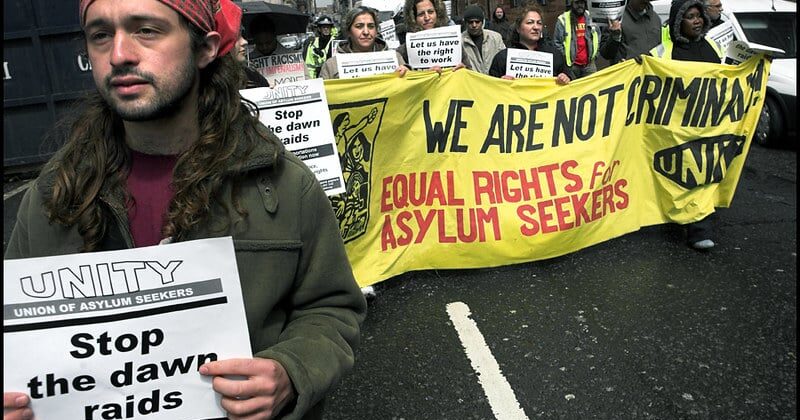

By Joe Crathorne
BETWEEN 600,000 and 1.2 million undocumented migrants and asylum seekers live in Britain, around 50,000 of whom are each year rounded up and sent to detention centres to be processed and, usually, deported.
At any one time up to 3,500 are held indefinitely in prison-like detention centres.
These workers, whose only crime is to come here to look for employment, are treated worse than criminals. They have no legal right to work, no right to benefits and no access to public services, like the NHS.
Socialists recognise them as sisters and brothers, part of the global working class, whose degradation degrades us all. The labour movement must renew and expand the fight to abolish all immigration controls and for their equal rights.
Latest attack
The latest government attack on migrants, Priti Patel’s Nationality and Borders Bill, is an escalation of the ‘hostile environment’, the dawn raids, deportation charter flights, and right-to-rent rules that characterise Tory immigration policy.
More than a decade of Tory governments has intensified state violence against migrants arriving in Britain. Theresa May’s ‘Go Home’ vans were only part of a sophisticated and increasingly pervasive border regime that has expanded from ports and airports to public services and working class communities.
Dawn raids, detention without trial and deportation charter flights largely operated by private security companies are the frontline of Priti Patel’s war on migrants. But under cover of this war, a surveillance state is being created which turns NHS hospitals into ID checkpoints, landlords into border guards, teachers into counter-extremism agents, and working-class communities into targets raided by UK Border Agency thugs.
Rishi Sunak’s three-year spending review has even earmarked a further £700m for a new fleet of boats to patrol Britain’s borders, lest anyone forgets ‘Britannia rules the waves’.
The Tories are pushing this anti-refugee law and order agenda from both ideological conviction and a need to demonstrate a Brexit dividend. But the new laws build on the detention and ‘no recourse to public funds’ policies instituted by consecutive Labour governments.
Despite the government’s rhetoric and exponential spending on deterrence, refugees and migrants driven to seek safety will always challenge their border regime. People resist immigration raids; others fight deportation. There are detainee support groups across the country. Migrant workers have organised against the bosses and won, creating the basis for a mass movement against immigration controls.
Detention centres
Since the Yarl’s Wood uprising of 2002, which saw half of the centre permanently destroyed only months after it opened, there has been an ongoing struggle inside detention centres. Sit-in protests, hunger strikes and escapes all stand as clear markers of migrant self-organisation.
And the pandemic has not stemmed the tide of this struggle. Less than eight months ago, 350 migrants in temporary ‘accommodation’ went on hunger strike against the awful conditions in an army barracks in Kent.
Parallel to this is the struggle on the streets. In May this year, hundreds of Glaswegians took to the streets to stop an immigration raid. Elsewhere groups like the Stop Deportation Network have blockaded detention centres to prevent the forced removal of refugees. In London, the Anti-Raids Network continues to raise the alarm on raids.
Direct action grabs the headlines, but behind the scenes there is a host of migrant solidarity organisations, supporting detainees or preventing deportation in the courts. Movement for Justice has pioneered this work, linking the various struggles inside and outside of detention.
And this combination of direct, legal and community action gets results. Recent examples include Osime Brown, a 22-year-old man with autism who was due to be deported to Jamaica—a country he left aged four. After a concerted campaign in the courts and streets, the Home Office was forced to cancel his deportation.
Whether in Glasgow or London, victories against deportation and indefinite detention are always the result of united action. But sadly, these victories are rare and localised. Beating the border regime, not only in individual cases but across the board, means organising on a class-wide basis to deny and disrupt the operation of the hostile environment and to repeal all immigration laws.
Labour Party members and trade unionists should oppose Patel’s Bill and propose their branches join the protests and mobilisations against detentions and deportations. If the UKBA organise immigration raids, they need to defend their fellow workers with strike action and pickets. They should actively recruit and organise the precarious workforces where migrants are more likely to be employed.
Trade unions should also refuse to cooperate with Immigration Enforcement or to carry out any immigration status checks for their employer. If we all stand firm, we can make their regime of terror unworkable: defiance, not compliance.
Unite the campaigns
Patel’s Borders Bill provides the opportunity to unite anti-racist, migrant solidarity and detainee support groups, alongside trade unions and allied Labour organisations, in a nationwide campaign against the government.
An open conference of migrant campaigns, trade unions and Labour branches could bring together the forces necessary to defeat the Nationality and Borders Bill. Such a conference would counter the influence of anti-migrant politics in our own movement, which seeks to accommodate to nationalism and racism rather than challenge it.
Most importantly a national campaign against all detentions and deportations would raise the struggle to a political level, where every migrant and refugee is entitled to stay and work here, not just individual cases that prove too hot for the authorities to handle.